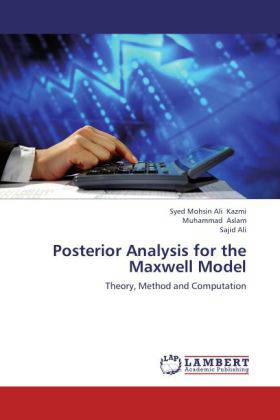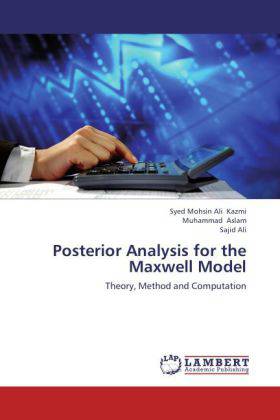
Bedankt voor het vertrouwen het afgelopen jaar! Om jou te bedanken bieden we GRATIS verzending (in België) aan op alles gedurende de hele maand januari.
- Afhalen na 1 uur in een winkel met voorraad
- In januari gratis thuislevering in België
- Ruim aanbod met 7 miljoen producten
Bedankt voor het vertrouwen het afgelopen jaar! Om jou te bedanken bieden we GRATIS verzending (in België) aan op alles gedurende de hele maand januari.
- Afhalen na 1 uur in een winkel met voorraad
- In januari gratis thuislevering in België
- Ruim aanbod met 7 miljoen producten
Zoeken
Posterior Analysis for the Maxwell Model
Theory, Method and Computation
Syed Mohsin Ali Kazmi, Muhammad Aslam, Sajid Ali
Paperback | Engels
€ 74,45
+ 148 punten
Omschrijving
The Bayesian approach to analyze different statistical models has developed great interest among analysts. Posterior distribution is the workbench of the Bayesian statisticians. It is obtained when prior information is combined with likelihood. Therefore the prior information is necessary for the Bayesian approach. The prior information is purely subjective assessment of an expert before any data have been observed. So here we consider different informative and non-informative priors and compare them to see which one is more suitable for our proposed model. The effort of current study is to explore the heterogeneous population using the Bayesian analysis for simple and mixture of the Maxwell distribution when data is censored and uncensored. Various types of comparisons of prior distributions for the parameter of the Maxwell distribution and loss functions are illustrated. We also consider Type I mixture of the Maxwell distribution which is member of the subclass of the exponential family. As an extension to this work, a comparisons of different loss functions are made. Moreover we have derived the limiting expressions for the Bayes estimators with their variances.
Specificaties
Betrokkenen
- Auteur(s):
- Uitgeverij:
Inhoud
- Aantal bladzijden:
- 140
- Taal:
- Engels
Eigenschappen
- Productcode (EAN):
- 9783659224782
- Verschijningsdatum:
- 7/09/2012
- Uitvoering:
- Paperback
- Afmetingen:
- 152 mm x 229 mm
- Gewicht:
- 213 g

Alleen bij Standaard Boekhandel
+ 148 punten op je klantenkaart van Standaard Boekhandel
Beoordelingen
We publiceren alleen reviews die voldoen aan de voorwaarden voor reviews. Bekijk onze voorwaarden voor reviews.









